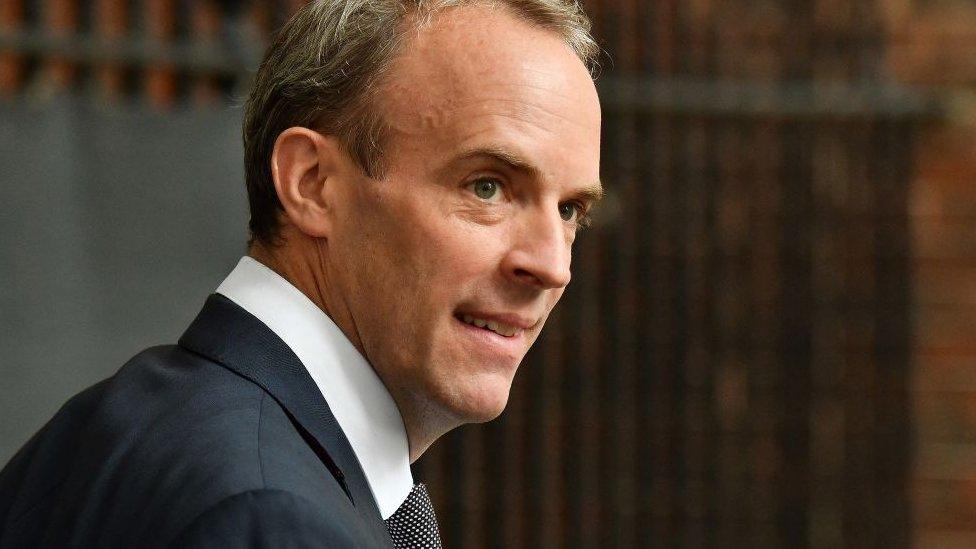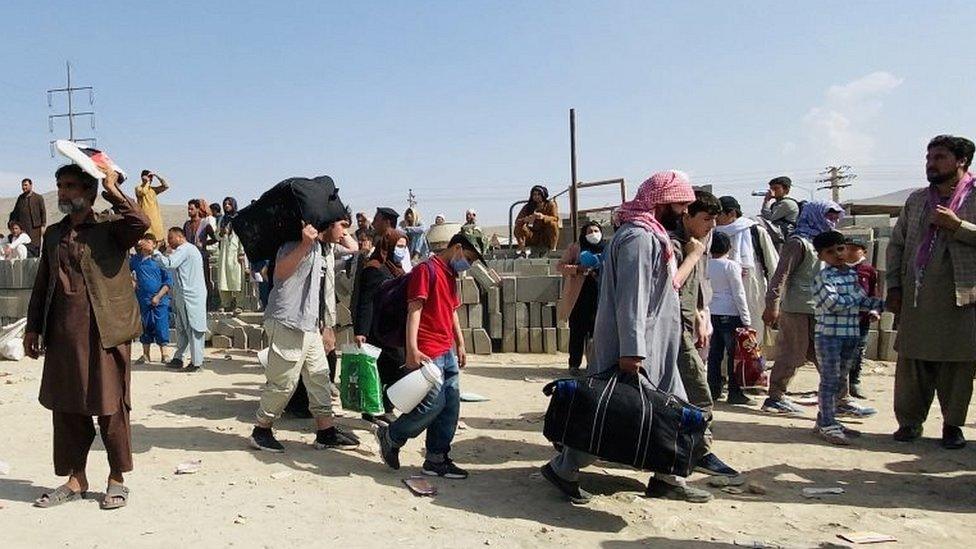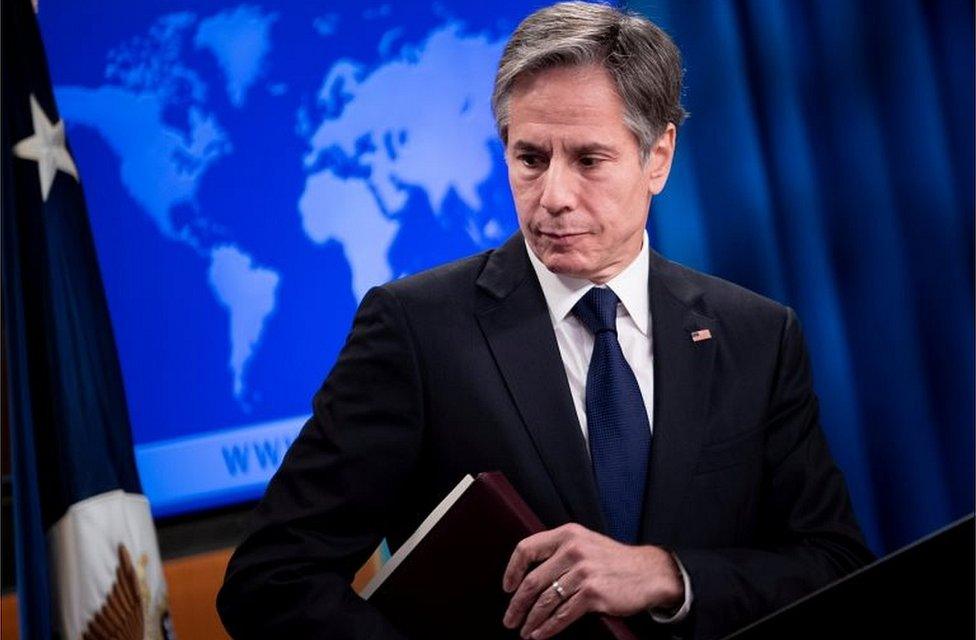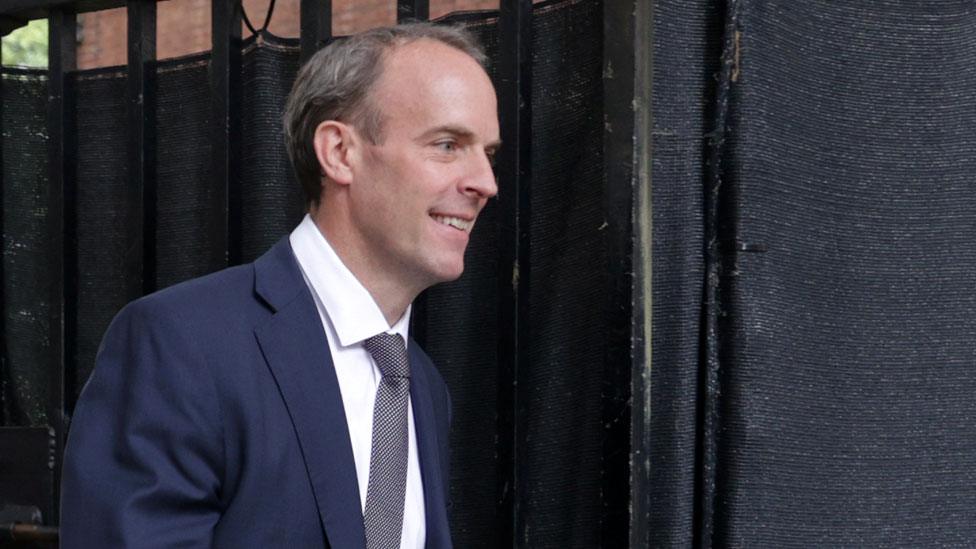Ministers never made key call to help stranded Afghan interpreters
- Published

Dominic Raab was on holiday in Crete when advisers reportedly suggested he should call his Afghan counterpart
The government is coming under pressure after it emerged ministers did not make a phone call about evacuating Afghan translators who had helped UK forces.
It had said Foreign Secretary Dominic Raab was too busy to speak to his Afghan counterpart, with a junior minister being asked to do so instead.
But the Foreign Office now says it "was not possible" to arrange the call before the Afghan government collapsed.
Mr Raab has rejected demands from opposition parties to resign.
It was revealed earlier this week that the foreign secretary was unavailable to make the phone call last Friday - while he was on holiday in Crete - as the Taliban advanced towards Kabul, Afghanistan's capital.
Labour asked whether Prime Minister Boris Johnson had spoken to Mr Raab while he was away - and whether he had given permission for him to leave the UK.
And Colonel Richard Kemp, a former commander of British forces in Afghanistan, told the BBC News Channel the foreign secretary's decision not to call his Afghan counterpart "typifies" a "ministerial lack of urgency" over the 20-year conflict in the country.
Meanwhile, the Times reports, external that the top civil servants at the Home Office, Foreign Office and Ministry of Defence are currently on holiday.

The situation outside Kabul airport is described as chaotic
Several thousand Afghan interpreters and other staff have worked for UK forces since the Nato invasion of the country in 2001.
Many are in fear of their lives, as the Taliban increase their hold on Afghanistan, with the United Nations warning that those deemed to have been "collaborators" by the group are being sought out in door-to-door searches.
Afghans who worked for the UK government can come to the UK as part of the Afghan Relocations and Assistance Policy.
The Home Office says it has resettled 2,000 former staff and their families in the UK since 22 June. The target is 5,000 by the end of this year.
But Kabul airport is reportedly in chaos, with Taliban militants controlling access, making access to planes difficult.
'Rapidly changing situation'
On Thursday, it was reported that Mr Raab had been advised by senior Foreign Office officials last week that he should make contact with Afghan Foreign Minister Hanif Atmar to request urgent assistance in rescuing interpreters.
Officials said it was important the call was made by Mr Raab rather than a junior minister, but they were told he was unavailable.
The Afghan foreign ministry reportedly refused to arrange a call with a junior minister, pushing it back to the next day.
But a Foreign Office spokesman has now told the BBC: "Given the rapidly changing situation, it was not possible to arrange a call before the Afghan government collapsed."
For Labour, shadow foreign secretary Lisa Nandy said: "For the prime minister and foreign secretary to be on holiday during the biggest foreign policy crisis in a generation is an unforgivable failure of leadership...
"The government's negligence will cost lives."
The foreign secretary gives a one-word answer when asked about his future.
Mr Raab earlier this week insisted he had been talking to overseas ministers and his team in London "on an hour-by-hour basis" while on holiday, and that he had returned "as soon as the situation deteriorated and demanded it".
On Thursday, he chaired a call of G7 foreign ministers to discuss Afghanistan, saying afterwards that efforts "to do everything possible to evacuate vulnerable persons" from Kabul airport were ongoing.
Some Conservative MPs are unhappy at the foreign secretary's handling of the crisis in Afghanistan, but Health Secretary Sajid Javid defended his colleague, calling him "one of the most professional and most effective ministers I've ever worked with".
Armed Forces minister James Heappey told BBC Radio 4's Today programme he did not know why the call had not been made.
But he added: "The reality is that no one phone call would have changed the trajectory of either the speed of collapse of the Afghan government, nor the speed at which we've been able to get the airlift running."
He said 963 people had been moved out of Kabul on Thursday, and that ministers were confident they could maintain that level over the coming days.

US Secretary of State Antony Blinken had two phone calls with the then Afghan president last week
US Secretary of State Antony Blinken had a telephone conversation with the then Afghan President, Ashraf Ghani, on Thursday last week.
According to the US government, Mr Blinken informed Mr Ghani he was accelerating "the tempo" of flights laid on for Afghans who had served the US - but the evacuation scheme has been criticised for being too slow., external
The two men had another discussion last Saturday, shortly before Mr Ghani fled Afghanistan.
'Working intensively'
The Times reports that Sir Philip Barton, Matthew Rycroft and David Williams, the permanent secretaries at the Foreign Office, the Home Office and the Ministry of Defence, are on leave.
A government spokesman said that "departments across Whitehall have been working intensively" on the situation in Afghanistan.
The BBC has been told that the civil servants in question are continuing to work while on holiday, and that, as the Ministry of Defence and Home Office have two permanent secretaries each, one is at work when the other is on leave.
The Foreign Office has a designated acting permanent secretary to cover periods of leave.
Related topics
- Published19 August 2021

- Published15 August 2023
